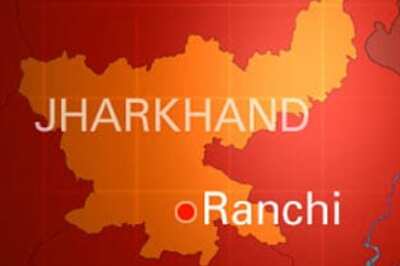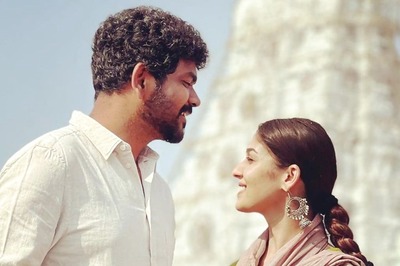
views
New Delhi: Jawaharlal Nehru University (JNU) has proposed a course that aims to make Sanskrit a more employable option for students.
The newly-founded School of Sanskrit and Indic Studies (SSIS) has proposed to introduce PG Diploma in Kalp Vedanga and offer courses to train pandits, who from across castes and gender, will comprise the next academic session of 2019. Girish Nath Jha, the first dean of the new SSIS told News18 that in future we can expect JNU-trained pandits to go to temples and perform rituals.
The students will dabble with the Śrautasūtras, based on the śruti, and the Smārtasūtras, rules based on the smriti or traditions to perform rituals, among other traditional texts. The proposal was made in the first meeting of School Coordination Committee, of School of Sanskrit and Indic Studies on February 23.
COURSES IN RELIGIOUS TOURISM, VAASTU SHASTRA
The school has proposed a PG Diploma course in Religious Tourism saying that the country has a rich tradition of dhams. Similarly, a PG diploma course in Vaastu Shastra is expected to bring viable options for students to get jobs with the civil engineering companies looking for experts in Vaastu Shastra.
With growing interest in Yoga Kendras, the MA course proposed in Yoga is expected to give the ancient heritage a push. The BSc course in Ayurveda has also been proposed to meet the demand of the growing industry.
In the next phase of additional courses, the administration plans a proposal for Sanskrit journalism and ‘rich traditions’ of classical music. The School Coordination Committee has 9 members, including internal and external, and one of them is well-known Sanskrit scholar, Kapil Kapoor who was at the forefront of starting the special Sanskrit centre in JNU in 2001.
The SCC meeting also had some special invitees from the School of Sciences and e-learning courses. It approved some new programmes and courses, and now a sub-committee is drafting the additional courses. They are also adopting an “inter-disciplinary approach to study the Indian past by reading the Sanskrit text”.
Once the draft is ready, it will go to the Board of Studies and will be presented in the next academic council meeting. If Academic Council approves it, the school intends to start the additional courses from the beginning of the 2019 academic year.
UPGRADED FROM SPECIAL CENTRE TO SCHOOL
The School of Sanskrit and Indic Studies was created after it was upgraded from the Special Centre for Sanskrit Studies to a full-fledged school in December 2017. The earlier centre was set up in 2001 with the goal to bring together — through interactive projects —traditional scholars and mainstream university scholars.
Currently, the school offers MA, MPhil, PhD programmes and five Certificate of Proficiency (CoP) courses in Sanskrit, Pali, Sanskrit Computational Linguistics, Yoga Philosophy and Vedic Culture. The new proposal that intends to broad base Sanskrit studies and make it employable includes, BA Sanskrit Online and Offline, MA in Yoga, which is right now being pursued as a certificate course, BSc Ayurveda Biology, PG Diploma Courses in Religious Tourism, Vaastu, Computational Linguistics and Kalp Vedanga.
The new uplift will give the school autonomy and power in academic and administrative departments. According to the JNU administration, it will soon have more power to plan and propose programmes to boost Sanskrit study.
BREAK THE IMAGE OF SANSKRIT
With the new courses, the dean of the new SSIS intends to ‘break the image’ of Sanskrit. “It is an ancient language, which is also ultra-modern and suitable for computers,” said Girish Nath Jha.
Jha, who has completed his MA, MPhil Linguistics (Computational Morphology) and PhD in Linguistics (Machine Translation) from JNU and then went to University of Illinois, Urbana-Champaign, USA for MA Linguistics, said that that the new proposal to link the language with employment will attract more students to study Sanksrit. “Students usually stop studying Sanskrit in Class 12. This will give them an incentive to opt for the language,” he said.
The members of the draft committee are busy designing the courses so that it is presented in the next AC meeting.
“I am sure JNU, which is such a liberal university, will certainly accept the radical proposal and take lead in making Sanskrit an employable option,” Jha said, adding, “JNU means radical, so we should do something as drastic as this.”
The new SSIS dean said that there will be no restrictions on the admission of students. “They can go to temples and perform rituals. Our courses would train experts in religious tourism, vaastu, Ayurveda and Yoga. Only the conservatives in the Academic Council would think that scholarship has been compromised,” he said.
Jha insists that it is the need of the hour to widen our understanding of the ancient texts and look at it with fresh perspective and in an inter-disciplinary way – involve other disciplines like Environment, History, Biotechnology etc. The initial plan is to get potential donors to fund the new courses, and government funding will be seen as the last resort.




















Comments
0 comment